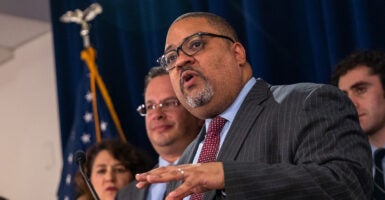Trump was convicted of 34 charges of falsifying business records with intent to conceal another crime. Alvin Bragg and his allies defend the prosecution as just, but their defenses are poor.
It is a poor defense of Bragg’s prosecution to say, as a New York Times columnist did, that it was based on a “mountain” of evidence, because more than evidence is required to make a prosecution just. Likewise, it is a poor defense of Bragg’s prosecution to say that a jury of Trump’s peers handed down the verdict because more than a jury verdict is required to make a prosecution just.
We would not say, for instance, that the prosecution of Richard and Mildred Loving for violating Virginia’s 1924 law outlawing interracial marriage was just even though there was ample evidence that Richard was white and Mildred black. Neither would we say that the conviction of Percival Coffin was just when the judge refused to tell the jury that Coffin was innocent until proven guilty.
A prosecution cannot be just unless the law and the process used to enforce it are just. Evidence and jury verdicts are only two parts of a process that delivers justice, and if any part of that process is tainted, its outcome is tainted too.
The first step in this process is writing and publicizing laws. Laws are unjust if they are enacted unconstitutionally, are not made known to the people they govern, fail to identify what they forbid, or require people to do the impossible. No jury can pronounce a just verdict under an unjust law no matter how much evidence it sees.
The second step is enforcement. Enforcement is unjust if the government claims power it does not have, wields the law not at bad actions but at people it thinks are bad, selectively spares its friends and targets its enemies, or fails to tell its target how he has violated the law. No jury can issue a just verdict against a man dragged unjustly into court no matter how much evidence it has against him.
The third step is the trial. A trial is unjust if due process is denied. If the judge is not impartial, the trial is unjust. If the judge allows the government to introduce unduly prejudicial or otherwise inadmissible evidence, the trial is unjust. If the man is denied the opportunity to present his best defense, the trial is unjust. If the judge instructs the jury wrongly about the law, the trial is unjust. Only after all of this does the jury come in. The jury may be open-minded, impartial, and fair, but none of that can cure an injustice that occurred before the jury deliberated.
Here, Bragg and Judge Juan Merchan tainted the process before any evidence was introduced and before the jury reached its verdict.
While campaigning, Bragg made a promise to get his man and, once elected, kept it. To do so, he twisted and warped the law to create a crime previously unknown to anyone and failed to notify Trump what that crime was until the end of the trial when, even then, he offered not one, but multiple theories that the jury could choose from.
Merchan is biased; he allowed Bragg to introduce irrelevant and highly prejudicial evidence; denied Trump the right to call a witness necessary to rebut one of Bragg’s legal theories; declined to sequester the jury; and failed to properly instruct the jury about a central element of Bragg’s case.
In Trump’s prosecution, we can’t say that the law was just because we do not know what the law was. And we can’t say that the enforcement and trial were just without lying through our teeth.
The criminal justice system aims at procedural justice, the best sort of justice you can get on this side of eternity. For it to hit its mark, it must remain a process that transcends any of the individuals—judge, prosecutor, defendant—that participate in it. The moment a judge or prosecutor undermines the process, even to get just one man, it ceases to be a process that transcends the people in it and becomes, instead, a tool no better than the person who wields it. Worse, in that form, its power to work injustice will be inversely proportional to its former ability to work justice. A great system of justice, once broken, will become a tool of great injustice.
Bragg and Merchan ignored procedure, took justice into their own biased and fallible hands, and, inevitably, delivered injustice. They deny it, of course, claiming to be faithful defenders of the rule of law, but it’s now clear that they pay lip service to the rule of law only to destroy it.
They were not the first to take a hammer to it, but they hit the hardest. It is not clear that the damage they did to the rule of law can be repaired, at least not while so many Americans support and defend their error.






























